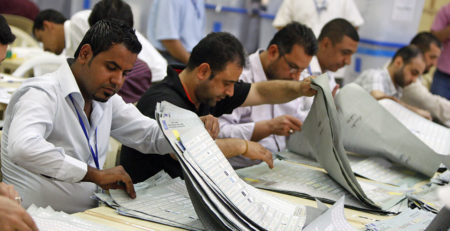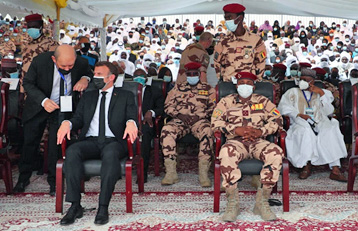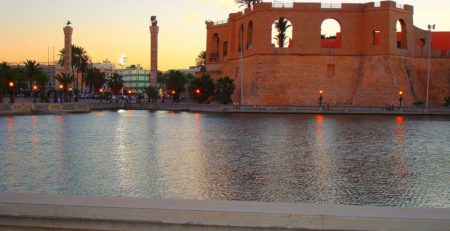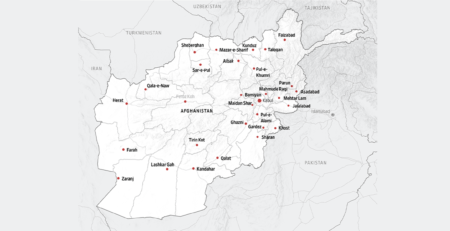Monthly Afghanistan News Roundup – March 2023
Within the framework of the Fiqhi Pathways project implemented jointly by CPI-Geneva and the Swiss FDFA’s Peace and Human Rights Division, engagement with Deobandi scholars of or close to Taliban and Pakistan is pursued to promote governance in line with IHL and Islamic jurisprudence through Fiqhi dialogue exchanges. This monthly newsletter aims to keep track of the discussions and debates among scholars on issues of governance policies of the Taliban, especially in the areas of education, social policies, and statecraft and governance institutions.
By Ozair Khan
Within the framework of the Fiqhi Pathways project implemented jointly by CPI-Geneva and the Swiss FDFA’s Peace and Human Rights Division, engagement with Deobandi scholars of or close to Taliban and Pakistan is pursued to promote governance in line with IHL and Islamic jurisprudence through Fiqhi dialogue exchanges. This monthly newsletter aims to keep track of the discussions and debates among scholars on issues of governance policies of the Taliban, especially in the areas of education, social policies, and statecraft and governance institutions.
1. The National Resistance Front struggles to keep its foreign allies
On March 3, Thomas Nicholson, the EU Special Representative for Afghanistan, said the EU does not support any armed resistance in Afghanistan. Taliban supporters welcomed this statement. They criticize groups like the National Resistance Front, a military alliance of former Northern Alliance members and other anti-Taliban fighters loyal to the Islamic Republic of Afghanistan, for being allegedly helped by Western countries. The Taliban refers in part to the Hudson Institute’s suggestion in September 2022 to support Ahmad Massoud’s NRF group. [1]
Interestingly, the NRF receives criticism from the Shia community, even though, historically, the Northern Alliance included Shia Hazaras. On March 6, a famous Shia preacher in Afghanistan, Sayed Issa Hosseini Mazari, wrote an article titled “Fronts of Resistance or Nuclei of Evil?!” criticizing the National Resistance for sitting comfortably in the West while encouraging sedition. He said: “Resistance is a sacred word used only for collective struggles and fighting against the infidels, such as movements… of Palestine and Lebanon or Afghans’ Jihad against the Soviet Union & the US.” [2]
The most significant political setback to the NRF happened on March 26 when Tajikistan decided to hand over one of the Afghan consulates to the Taliban. This came as a surprise to many observers since Tajikistan is considered one of the main allies of the National Resistance Front. Tamim Asey, an Afghan Senior Visiting Research Fellow at King’s College London and regular contributor to Foreign Policy magazine, tweeted: “Tajik President, Imam Ali Rahman, has realized that the NRF has turned into a family business with little to no political & military achievements except convening conferences. “[3]
2. Muslim countries offer Political, financial, and religious jurisprudence incentives to tackle the issue of Girls’ Education
In March 2023, girls’ schools remain closed, but notable events have occurred regarding this issue. On March 29, the Islamic Emirate’s Political Deputy Foreign Minister, Shir Mohammad Abas Stanikzai, visited the Afghan consulate in the UAE. He emphasized the importance of education for both men and women. He most notably affirmed: “When we sit together with elders and scholars, almost 90 percent of them have the same opinion: that the Islamic Emirate should reopen schools for girls”. Stankizai best represents the more pragmatic strand within the Taliban ranks. He has criticized the movement on several occasions. During his visit, he also called for the US to resume its diplomatic presence in Afghanistan.
On the other hand, the most traditional Taliban officials in power are frustrated by the open criticism coming from within the Taliban ranks. For example, on March 11, Nada Mohammad Nadeem, the Taliban Minister of Higher Education, stated at a students’ graduation party in Kandahar, the birthplace of the Taliban and seat of its supreme leader, that those who preach against the Taliban rule and engage in its destruction “deserve death.” These are strong words, especially after repeated criticisms throughout February against the Islamic Emirate by well-known Taliban leaders, such as Sirajuddin Haqqani. It is clear that the issue of banning girls’ education is widening the rift within the Talibans’ ranks. [4]
Meanwhile, there has been a crackdown on those from the population, putting into question some of the Taliban policies. On March 27, the Islamic Emirate detained one of Afghanistan’s most prominent education activists, Matiullah Wesa. The arrest has unnerved even elements among some Taliban supporters who criticized the lack of warrants and due legal process. The authorities have not made comments about the specific reason behind the arrest. [5]
Another aspect of girls’ schooling is the opportunity it gives to foreign governments to have a foot in Afghanistan. This is shown by two meetings last month between the Islamic Emirate and delegations from the UAE and Qatar, possibly indicating rivalry between the two Gulf countries to gain influence in Afghanistan.
Firstly, a high-ranking delegation of scholars from the UA E met with Amir Khan Muttaqi, Minister of Foreign Affairs, and several scholars on March 17. The head of the Emirati delegation, Mr. Omar Habtoor Al-Darai, expressed his satisfaction with the current situation in Afghanistan. Both parties were reminiscent of UAE’s support against the Soviet invasion in the 1980s. The Emirati delegation said the UAE is ready to cooperate in the field of education but did raise concerns about the ban on girls’ education. The Taliban Minister of Interior, Sirajuddin Haqqani, assured his guests that the restriction on girls’ education is temporary and that the Islamic Emirate considers God has rendered education mandatory for both men and women. [6]
On March 10, the UAE handed over the Afghan consulate in Dubai to the Taliban. After countries like Turkey (Tajikistan followed later in the month), the UAE is one of the latest governments in the region to hand over the Afghan embassy (or one of its consulates) to the Islamic Emirate. Kabul sees it as a breakthrough since it reduces their international isolation. Turkey, Iran, and UAE are home to many Afghans, so these countries’ decisions could be more due to practical necessities. [7]
Secondly, on March 23, a delegation from the Afghan Ministry of Education discussed economic challenges and education in Doha, according to the Afghan news outlet Tolo News. The two parties agreed to “provide high-quality education opportunities for all Afghan students in all regions.”. The Qatar Fund for Development and Education Above All announced they would support 30,000 out-of-school children, targeting 50% of girls. [8] The Afghan delegation praised Qatar’s efforts in helping them to come up with practical solutions to improve access to education.
The OIC is also continuing its attempts to convince the Taliban to reconsider their decision to close girls’ schools. On March 17, during a meeting of the Organization of Islamic Cooperation (OIC) in Mauritania, Secretary-General Hissein Brahim Taha said that the OIC would continue its dialogue with the Islamic Emirate alongside the International Islamic Fiqh Academy (IIFA). Brahim Taha also explained that the OIC would send a team of religious scholars to Afghanistan to discuss women’s education and work issues. [9]
3. Tehrek-e-Taliban Pakistan (Pakistani Taliban) update
There are almost daily attacks in the Pashtun regions of Pakistan, mostly claimed by the Pakistani Taliban. On March 16, The Pakistani Minister of Foreign Affairs, Bilawal Bhutto Zardari, said on a US news channel that the steady increase in armed groups’ activities in Pakistan coincides with the fall of Kabul. He, therefore, criticized the lack of effort from the Taliban to control the Pakistani Taliban who are hiding on its soil according to many of its past declarations. During his interview, Bhutto also blamed the current economic situation for leading people to join armed groups. He was very vocal about the US decision to freeze Afghan assets. Bhutto voiced concerns about a possible spillover effect of the Taliban’s decree on girls’ education in Pakistan. He claims there is a possibility that conservative religious parties in Pakistan would also push for banning girls’ education in Pakistan.
It is worth noting that on March 5, Jamiat Ulema-e-Islam, a Pakistani Deobandi political party, held a graduation ceremony for 500 religious students in North Waziristan, one of the birthplaces of the Pakistani Taliban. The ceremony participants called on the Pakistani government to establish complete law and order in Waziristan by starting negotiations with the Pakistani Taliban militant group. The attendees also stated that Pakistani security forces should vacate Madrasa buildings and stop harassing people at checkpoints. [10]
The month of March did bring positive news. In their latest statement, the Pakistani Taliban announced, on March 12, that they would not target political rallies and polling stations in the upcoming provincial elections. [11]
4. IS-K and Taliban zero-sum fight
There was a marked increase in the activity of IS in Pakistan and Afghanistan in March. In Pakistan, the Islamic State Province of Pakistan (ISPP) committed, on March 6, its third attack on Pakistani soil since the beginning of the year. ISPP was created in 2019 and is closely linked to Islamic State Khorasan (IS-K) but operates autonomously. Most of its fighters are Pakistanis from various factions of Pakistan-based militant groups. [12]
As for Afghanistan, IS-K killed, on March 9, Mohammed Dawood Muzammil, one of the foremost prominent Taliban governors known to fight armed groups such as IS-K. This assassination was in response to the many Taliban raids on IS-K hideouts. Observers say it is a new escalation in the conflict between the Taliban and IS-K, even though the Taliban continue to play down the IS threat within the country. [13]
In retaliation, the Islamic Emirate killed, on March 26, the top IS-K ideologue, Malawi Ziauddin, in retaliation for the assassination of Mohammed Dawud Muzzamil. Ziaudin was the second highest-ranking leader in IS-K in charge of courts. For Zalmay Khalilzad, former US ambassador to Kabul and representative of the US during the Doha talks, the elimination of Ziaudin was a big blow to IS-K. He also thought it proves that the Taliban are trying to fulfill the Doha agreement. He, therefore, urged the Biden administration to establish diplomatic ties with the Islamic Emirate. [14]
5. The Islamic Emirate’s self-promotion
Speaking about establishing ties with the US, the Taliban’s Minister of Foreign Affairs, Amir Khan Muttaqi, published on March 22 an op-ed on Aljazeera.com that was widely shared online. Muttaqi explained that the Islamic Emirate is ready to work with the United States as long as the Biden administration puts an end to the various sanctions, which he considered one of the biggest causes of the disastrous humanitarian situation in Afghanistan. In the article, Muttaqi also mentions that the Islamic Emirate is a functional government taking crucial decisions that benefit the international community, such as the recent ban on narcotics. As a matter of fact, on March 18, the Taliban’s leader Haibatullah Akhunzadah issued several decrees. He instructed all government officials to avoid nepotism and avoid hiring close relatives. Another order was related to the ban on the cultivation of narcotics. [15]
Although not mentioned in Muttaqi’s op-ed, the Taliban will also capitalize on their decision to appoint to critical governmental posts some non-Pathans. On March 25, Abdul Hamid Khorasani, a Tajik figure from Panjshir province, was appointed as the new governor of the Ahmadabad district of Paktia Province, mainly inhabited by Pashtuns. Taliban supporters applauded this decision in that what unites the Taliban is Islam, not ethnicity. [16]
The Taliban will probably also advertise their apparent good relationship with the heads of the Shia community. On March 26, Iran’s ambassador to Afghanistan, Mohammad Hassan Kazeimi Qomi, declared after a meeting with Afghan Shia scholars that he was pleased with the interaction of Afghan Shiites and the Islamic Emirate. Like many states, Iran has not yet recognized the Taliban rule but has significant interactions with the Islamic Emirate. [17]
References
[01] https://bakhtarnews.af/en/eu-not-support-any-armed-resistance-in-afghanistan-nicholson/
https://www.hudson.org/node/45119
[02] https://twitter.com/hosseinimazari/status/1632561473107918850?t=RxyeOPDwWL69dM3E0GiEIw&s=19
[03] https://eurasianet.org/tajikistan-taliban-take-control-of-consulate
https://twitter.com/tamimasey/status/1640030733585510402?t=DeaXSZKSdN9zQYi-c7fMLA&s=19
[05] https://www.bbc.com/news/world-asia-65095663
[06] https://kabulnow.com/2023/03/uae-delegation-urges-the-taliban-to-lift-ban-on-girls-education/
[07] https://tolonews.com/afghanistan-182500
[08] https://tolonews.com/afghanistan-182595
https://twitter.com/qatar_fund/status/1638490153088892928
[09] https://tolonews.com/afghanistan-182545
[10] https://twitter.com/KhalidJanDawar1/status/1632374660720472064?t=1HPaZhindy-a0eyo7cCiOA&s=19
[11] https://twitter.com/khorasandiary/status/1634949629082238976?t=iIpKVbDASO0o3a2KRABrUQ&s=19
[12] https://twitter.com/khorasandiary/status/1632811064684363777?t=rQ_x88yl6ujNxKg-el-5nA&s=09
[14] https://twitter.com/GDI1415/status/1640052881041633281?t=RdsDLnaJgfOXwzHsXkH0kg&s=19
https://twitter.com/realZalmayMK/status/1640754538704429062?t=Ty1bHa9UxDH4ti_-mB_ZSw&s=19
[16] https://twitter.com/MJalal0093/status/1639621892637073408?t=74tLeK1WssnjXvQ6xAPrtg&s=19
[17] https://8am.media/qomi-the-way-afghan-shiites-interact-with-the-taliban-is-positive/















